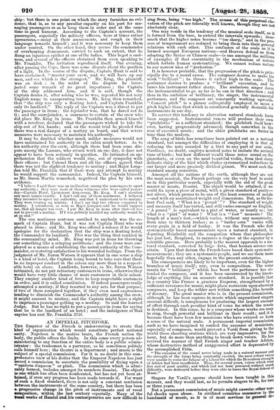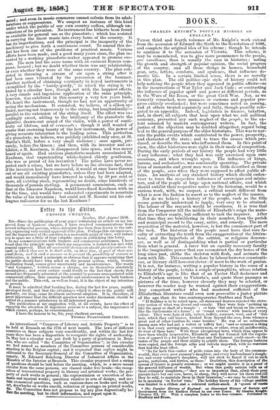AN IMPERIAL PITCHFORK.
THE Emperor of the French is endeavouring to create that kind of organization which would constitute perfect national unity. Napoleon is the motive brain the French nation the body, the public offices the limbs. In this sense every person ad- ministering to any function of the entire body is a public admin- istrator : the tradesman is a purveyor, as he sometimes politely calls himself here; the theatre is a department; and music is the subject of a special commission. For it is no doubt in this com- prehensive view of his duties that the Emperor Napoleon has just issued a commission to ascertain, the possibility of fixing upon a "uniform diapason" or pitch. The commission which is admi- rably formed, includes amongst its members Roseini. The object is one which has often been desiderated, but has not yet been at- tained, if even any progress has been made towards it. For want of such a fixed standard, there is not only a constant confusion between the instruments of the same country, but there has been a progressive change in. the pitch of instruments and of vocal composition, within the last century especially. Many of the vocal works of Handel teal his contemporaries are now difficult to
sing from, being "too high." The causes of this perpetual ele vation of the pitch are tolerably well known, though they are no; absolutely clear.
One may reside in the tendency of the musical scale itself, as it is formed from the base, to extend the intervals upwards ; ' much that the higher notes become " too sharp," and in the pro- cess of temperament are reduced to bring them into their general relations with each other. This confusion of the scale as it is formed amongst European nations—and Heaven defend us from adopting the Syriac or Chinese scale—is one amongst the millions of examples of that eccentricity in the mechanism of nature which forbids human systematizing. We cannot reduce nature to our narrow idea of "perfection."
It is however probable, that the progression of the pitch is prin- cipally due to a morel cause. The composer desires to make his work " brilliant" ; he throws it rather high in the scale. The performer desires to produce a "brilliant" execution, and he tunes his instrument rather sharp. The audacious singer dares the instrumentalist to go as far as he can in that direction ; and thus in the ambition of brilliancy, the singer, the instrumental performer, and the composer are constantly working upwards.
Concert pitch" is a phrase colloquially employed to mean a pitch higher than that which is considered generally desirable for instruments in our day.
To correct this tendency to aberration natural standards have been suggested. Instrumental tuners will produce their own. "pitchforks" as a sufficient standard ; the pitchfork itself how- ever, having progressively advanced, though somewhat in the rear of executed music ; and the older pitchforks are flatter in tone than the modern.
The song of birds has sometimes been pointed out as a natural standard, but amongst the difficulties of employing it is that of reducing the note sounded by a bird to anyrt of our scale. imitate Gardiner, no doubt, employs musical notes to the natural tune of birds; but how different would those notes sound on the pianoforte, or even on the most beautiful violin, from that sharp delicate chirp of the bird which eludes systematized reductions to our larger and more precisely divided gamut. We must seek the standard among ourselv6s.
Amongst all the nations of the earth, although they are not the most musical, the French perhaps are the very best to assist us in this particular search, especially with the aid of the great master of music, Rossini. The object would be attained, if we could fix upon a piece of metal, with a given standard of purity— not silver, which proves to be one of the least sonorous of metale —and with an ascertained weight and dimensions. But, as Sir Ro- bert Peel said, "What is a pound ' " ? The standard of weight and measure itself has varied, and still varies amongst us English. "A pound" is equivalent to a pint of water, or nearly so ; but what is a "pint" of water ? What is a "foot" measure? The length of a man's foot,—which varies, without any monstrosity, from nine to thirteen inches ; as a "barley corn" varies with every grain in a field of barley. It was the French who first systematically based measurements upon a natural standard, in deputing Humboldt and the companion whom that philosopher has just lost, Bonpland, to measure a degree at the equator by a scientific process. Here probably is the nearest approach to a na- tural standard, corrected by large data, that human science can attain. -Upon that datum the French have based their systematic measurement ; they are a systematic people, and we see them more hopefully than any other, engage in the present enterprise. The consequences are likely to be important, even for the higher branches of music itself; nay, even to composition. The same mania for " brilliancy " which has beset the performer has at- tended the composer, and. it has been uncorrected by the know- ledge of anything like an accurate standard. It is possible that in a country like France a gracious Emperor, strengthened by a sufficient reverence for music, might place restraints upon aberrant composers, and keep the wilder sort within somethingslike bounds of decency. The great master who is in the present" commission, although he has been copious in music which unpractised singers account difficult, is conspicuous for producing the largest amount of effect through each peculiar kind of voice for,which the musio is destined. In this sense, he is a composer whose works are easy to sing, though powerful and brilliant in their result ; and it is because there have been few musicians who have evinced so keen a sense of the natural scale. A permanent imperial commission such as we have imagined to control the excesses of musicians, especially of composers, would prevent a Verdi from giving to the world those shouting orations which are very impressive, for the hour, but do more than anything to break down. voices. He has revived the manner of that French singer and teacher Adrien, whose destructive method of exaggerated effort is deprecated by the accomplished Fetie. "The emission of the sound never being made in a natural manner and the strength of the lungs being constantly exerted, the most robust voices were unable to resist the fatigue of a labour for which the Herculean strength of Athien had been insufficient. Thus for several. years, voices which wove free and of good quality, and which. had not been procured without mueh difficulty, -were destroyed before they were able to leave the Royal Schools Music. '
Singers for Verdi's operas should have been taught in this manner, and they would last, as he permits singers to- do, f fo
or three years.
But a permanent commission of music might exercise otherrnt"se- ful cheeks upon abuse. In civilized countries commerce is th e handmaid of music, as it is of most services in general de-
d ; and even in music commerce cannot refrain from its adul-
tions or suppressions. We suspect an instance of this kind under which the public of our .own country suffers, although un- oonscious of its privation. No instrument has hitherto been found so available for general use i
as the pianoforte ; which has assisted
in carrying the finest music into every home of the country. It has its imperfections, and the principal is the incapacity of the machinery to give forth a continuous sound: To amend this de- fect has been one of the problems of practical music. Various sorts have been made,. and a good many years since, the plan in- vented by a working pianoforte-maker appeared to promise sue- . The man had the same name with an eminent Roman com- poser, Isouard ; but we doubt whether there was any relationship, or even whether they were of the same country. The plan con- sisted in throwing a stream of air upon a string after it had been once vibrated by the percussion of the hammer. Another method of obtaining continuity in keyed instruments is exemplified by the "hurdy-gurdy," in which the string is vi- brated by a circular bow, though not with the happiest effects. A very simple and ingenious application of the same principle, however, was exhibited in this country a very few years back. We heard the instrument, though we had not an opportunity of seeing the mechanism. It consisted, we believe, of a silken cy- linder, moving not transversely to the string, but longitudinally— parallel to the extension of the string itself. The effect was ex- ceedingly sweet, adding to the brilliancy of the pianoforte the plaintive drawn-out sound of the violin, with a power of conti- nuity ad libitum, and of crescendo ; though it still wanted of course that crowning beauty of the bow instrument, the power of giving accurate intonation to the leading notes. This perfection of a pianoforte, we believe, was publicly exhibited only once, at St. Martin's Hall, before a very small audience ; once again, pri- vately, before the Queen ; and then, with its inventor and ex- hibitor, a M. Kaufman, it disappeared into space, and was never heard of again. Had envious pianoforte-makers assassinated M. Kaufman, that unpretending white-haired elderly gentleman, who was so proud of his invention? The police have never re- ported such a crime, but we have before us the obvious fact, that if the invention had been successful, it would at once have thrown out of use all existing pianofortes, unless they had been adapted, and would immediately have lowered in value, by 50 per cent or more, all existing stock, representing no doubt, some hundreds of thousands of pounds sterling. A permanent commission, such as that of the Emperor Napoleon, would have fixed Kaufman with us for the time, and would have exhausted experiments to ascertain the value of his invention ; but could not M. Rossini and his col- leagues rediscover for us the lost Kaufman ?



























 Previous page
Previous page